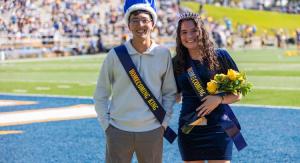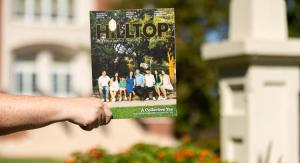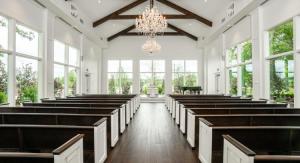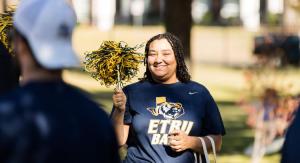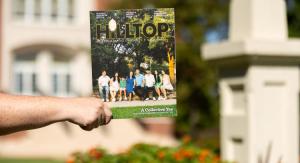This editorial style guide was prepared by the Office of Marketing and Communications and is based on the Associated Press Stylebook and Libel Manual, the A Manual of Style (The University of Chicago Press) and currently accepted style for universities in the United States and East Texas Baptist University.
Jump to: A B C D E F G H I J K L M N O P Q R S T U V W X Y Z
Abbreviations
- Acceptable if part of a formal name (Morgan Stanley & Co.).
- Avoid in running text (Professor Jones, not Prof. Jones).
- U.S. is acceptable as an adjective, but use United States for the noun. U.S. is one of the few abbreviations for which periods should be used.
Acronyms
- Acceptable on second and subsequent references after a first spelled-out use.
- Acceptable without first spelling out if initials are widely recognized (e.g., CEO, SAT, NCAA, HMO, NASA, FBI).
Addresses
- In running text, spell out North, South, East, West before the street name; spell out Street, Avenue, Road, Drive, Boulevard, and the like. In mailing panels, the name of the state may be given with postal abbreviations.
- Use official names of offices (Office of the Provost, not Provost's Office).
- East Texas Baptist addresses generally follow this order:
East Texas Baptist University
Name of Department/School
One Tiger Drive
Marshall, Texas 75670
Adviser/advisor
- Advisor is the preferred spelling.
Alumni
- In alumni newsletters and often in other publications, it is desirable to note that a person attended East Texas Baptist. Alumni status is granted to people who didn't leave East Texas Baptist with a degree. The year of graduation/withdrawal from the University is used in parentheses after the name: John Smith ('99). When necessary for clarification, the major and the graduation year may be listed in parentheses after the name. Mary Smith (Spanish '99).
- The exception is for people with advanced degrees in the arts and sciences. Designate these by the degree followed by the field in lowercase: (Ph.D. chemistry '99).
- Graduates of the year 2000 are designated with '00.
Ampersand (&)
- Use only when it is part of a company or organization's formal name.
- Do not use in bodies of text to replace the word and.
- Ampersands can be used in titles.
Apostrophes
- Do not use to form plurals (it should be 1940s, not 1940's) unless it would be confusing without (A's and B's, not As and Bs).
- Use apostrophes for master's and bachelor's degrees; doctoral degree or doctorate should be used rather than doctor's.
- Do not use apostrophes for associate degree; associate degree rather than associate's degree.
B. H. Carroll Theological Seminary
- When referencing B. H. Carroll Theological Seminary, the initials are followed by periods, and there is a space between them.
Capitalization
- Official names are capitalized (Department of History and Political Science) and unofficial names are not (history department).
- Capitalize:
- Board of Trustees, when referring to East Texas Baptist's
- Commencement, when referring to East Texas Baptist's (2010 Commencement)
- Specific teams: ETBU Basketball, Tiger Baseball, ETBU Tennis team (informal "the basketball team," "men's soccer")
- Conferences (Southern Baptists, Evangelicals, and the Future of Denominationalism)
- Course titles
- Geographical areas and localities (the Midwest, the South Side of Chicago, New York City)
- Government bodies (the U.S. Congress, the U.S. Supreme Court)
- Historical periods (the Depression, the Enlightenment)
- Homecoming when referring to ETBU's, but lowercase in general use
- Names referring to God (Jehovah, Christ, Christians); pronouns referring to God (He, Him, His); adjectives incorporating God's name vary (Christ-like, but godly)
- Bible, but biblical
- University, when referring to East Texas Baptist. (The prospective student took a tour of the University.)
- Words denoting family relationships used in place of a person's name (Grandmother Jones)
- Registered trademarks (Canon)
- "The" in proper names (The Southern Baptist Theological Seminary, The Jackson Sun; but the Southern Baptist Convention)
- Seasons in conjunction with the year: Spring 2023 graduates (lowercase spring enrollment)
- Lowercase:
- Job titles (the chief executive officer, the sales manager)
- Departments or offices that are not the official name (the alumni office)
- graduation
- Nouns used with numbers to designate chapters, rooms, pages (chapter 1, room 234, page 1, page 449)
- Derivative adjectives (French fries)
- Simple directions (the west side of Marshall)
Captions for photos
- Use a caption if there is a person, place, or situation that the reader is likely to want to identify.
- Indicate student class and major before name when three students or fewer are in a photo. (senior accounting major Brad Smith)
- Use (from left) or (front row, from left) if there might be confusion about identity.
- Do not use a middle initial if the full name is used with the initial in the story.
- Do not use periods in captions that are not sentences, except to be consistent with other captions in the same spread or publication.
- Do not include the obvious (e.g., The group is standing by Toby).
Catalog
- Catalog is the correct spelling for East Texas Baptist University's publication in all references, not catalogue.
- For example: "the 2025 Undergraduate Catalog," "You may verify major requirements by looking in the catalog," "We reviewed catalogs from 120 universities."
Chair
- Use instead of chairman or chairwoman (chair of the English department). An exception may be made for chairman or chairwoman of the board.
Citations
- Treat all citations within a publication consistently.
Cities
- Major U.S. cities do not need state identifiers in running text, with the exception of cities of the same name in different states. See "states" for a partial list.
- Cities commonly associated with a country do not need a country identification (London, Bangkok, Tokyo, Toronto).
Comma
- Use a comma before "and" or "or" in a series.
- Use commas before and after state names when they appear with cities. (Her brother moved to Sacramento, Calif., after graduation.)
- If the day of the month appears, use a comma before and after the year (by the January 15, 2025, deadline).
Contact information
- To avoid dating a publication, use a job title rather than a name in contact information unless there is a compelling reason for using a name.
Core commitments
- East Texas Baptist University's core commitments should be capitalized in headings or headlines and always listed in this order:
Embracing Faith, Engaging Minds, Empowering Leaders, Enhancing Community
Corporations
- Use the name used by the company, including abbreviations and ampersands. However, Inc. or Ltd. may usually be dropped, and "the" should not be capitalized.
- Abbreviations are acceptable (Co., Corp., etc.) in notes, bibliographies, and lists.
- Do not use all caps unless the letters are individually pronounced (USA).
- Do not put in quotation marks.
Courtesy titles
- After a first reference, subsequent references generally use only a person's last name, except in obituaries. Mr., Mrs., Ms., Dr., Rev., Dean, and Professor should not be used in second references except in quoted material. An exception may be made for donors when a development officer requests it.
- See "degrees (academic)" and "Dr." for discussion of Dr.
Dashes
- When you type a space and one hyphen between text, Microsoft Office Word automatically inserts an en dash ( – ). For example, if you type See pages 3 - 10, Word converts it to See pages 3 – 10.
- If you type two hyphens and do not include a space before the hyphens, an em dash ( — ) is created. For example, if you type Many flowers--including perennials and annuals--grow here. Word converts it to Many pines—including ponderosa and lodgepole—grow here.
- Use en dashes to denote a range (pages 40–48) and to join adjectives when one of the adjectives is already a compound (Shreveport–Dallas route).
- Dashes may be used for material that amplifies, explains, or digresses. Commas often may be used for the same purpose.
- Use spaces around em dashes (the four states — Wisconsin, Illinois, Indiana, and Michigan — that border Lake Michigan).
- Hyphens, not en dashes, should be used in sports scores.
Dates
- Use an en dash to show a range of dates, and do not repeat 20 (2007–08, not 2007–2008).
- If the day of the month appears, use a comma before the year (by the January 15, 2018, deadline).
- Do not use a comma between the month and the year alone (by the January 2018 deadline).
- Use the year with the month only if it is not the current year.
- Do not use st, nd, rd, th, even if dates are adjectives (March 1 event, not March 1st event).
- Months standing alone are not abbreviated.
- Months with five or fewer letters should never be abbreviated.
- Use numerals for decades (1960s or the '60s).
Degrees (academic)
- Use periods in Ph.D., B.S., M.B.A., etc.
- Indicate student class and major before name when three students or fewer are in a photo. (senior accounting major Brad Smith)
- Capitalize Bachelor of Science, Master of Arts
- Do not capitalize the field (Bachelor of Arts in philosophy) unless, of course, it is a proper noun (Bachelor of Arts in English) or part of the degree name (Master of Education)
- Degrees are generally not given immediately after a name, with the occasional exception of lists. Then, the highest degree earned is usually given.
- Do not use apostrophes for associate degree; associate degree rather than associate's degree.
- Use an apostrophe in bachelor's degree and master's degree. Do not use doctor's degree; doctoral degree or doctorate is correct.
Departments and programs
- Full formal names of East Texas Baptist University departments and programs are capitalized (Department of Communication).
- Shortened second mentions are lowercased (the communications department).
Dorm
- Do not use dorm when referring to East Texas Baptist University's residence accommodations.
- residence life staff, residence complexes, residence apartments, or residence complex apartments
Dr.
- Use Dr. for Ph.D. and Ed.D.
- Identify a specialty after the name or use some other language that implies a medical degree ( Dr. Joseph Smith, cardiovascular surgeon).
- One word; lowercase it except at the start of a sentence.
- Do not break a line after a period within an email address. Bring the period down to start the next line:
If an email address does not fit on one line, do not introduce hyphenation when breaking it.
If an email address is at the end of a sentence, include the final punctuation.
Emeritus, emerita
- Follows professor (professor emeritus, not emeritus professor).
- Use emerita for a woman.
- Use emeriti for the plural.
Endowed professorships
- Capitalize whether before or after the name.
- If in doubt about the correct title, call the marketing department.
Faculty
- May be singular or plural, depending on the context, but be consistent within a context. East Texas Baptist University ordinarily uses "faculty members."
First annual
- Do not use. Use The First or Inaugural. An event must be held two consecutive years before it can be labeled annual.
Forms
- Capitalize formal name (Application for Undergraduate Admission), but do not use quotation marks or italics.
Fractions
- Write out and hyphenate (two-thirds, three-fifths) in text.
- A fraction and a whole number appear as numerals with no space between them (3¼).
Gender language
- Use whenever possible (chair, chairperson, police officer, etc.).
- One way to get around the his or her dilemma is to restructure the sentence in the plural. (Each student should purchase his/her own lab manual. Students should purchase their own lab manuals.)
Grades, grade point average
- Use all capitals to abbreviate (GPA).
- Do not put in quotation marks.
- Use an apostrophe for plurals (A's, B's).
- Depending on the publication, it may be acceptable to abbreviate GPA in the first reference.
Headlines
- The use of downstyle or upper- and lowercase headlines is generally determined by the formality of the publication and the design, but once a style is chosen, it should be followed consistently within a publication. In downstyle headlines, the first word and proper nouns are capitalized. In upper- and lowercase headlines, every word is capitalized except articles (a, an, the), coordinate conjunctions (and, or, for, nor), prepositions, and "to" in infinitives.
- Use numerals for all numbers in headlines, regardless of size. So you’d write “5 Ways to Get Involved” or “125 Students Attend Conference.”
Home school, home-schooled, home-schooler, home schooling
Hyphens
- In general, do not hyphenate words beginning with the prefixes co, non, pre, post, or re unless there is a possibility of confusion (co-op, post-master's) or the root word begins with a capital letter (post-Renaissance).
- Hyphenate words beginning with the prefix self.
- Hyphenate an adjective-noun modifier if there is a possibility of confusion (senior-class speaker). It is unnecessary to hyphenate when the pair is familiar (high school student).
- Hyphenate compounds used as adjectives (decision-making), but not as nouns (decision maker).
- Hyphenate University-wide and campus-wide.
- Hyphenate missionary-in-residence, scholar-in-residence.
- Hyphenate student-athlete.
- Do not hyphenate a modifier that comes after the noun. (He is a writer in residence. They live off campus.) An exception is part-time, which is always hyphenated.
- Do not hyphenate compounds with vice (vice chair, vice president).
- When more than one prefix is joined to a base word, hyphenate the prefixes standing alone (micro- and macroeconomics).
- Do not hyphenate fundraising, freelance, yearlong, health care, African American, Asian American.
- An en dash, not a hyphen, should be used with a range of dates (1967–69) or times (5:00–7:00 p.m.) or to join adjectives where one of them is already a compound (post–Civil War).
Initials
- Use middle initials in formal publications unless a person prefers otherwise.
- Be consistent from person to person in the use of the middle initial.
- A space should not separate two initials.
- In scientific citations, it is acceptable to use only a single initial and a last name. However, a single initial should not be used in running text.
Invitations
- Do not require end-of-line punctuation.
- Numbers greater than 10 may be spelled out.
- Street numbers may be spelled out.
- :00 or o'clock may be used in time.
Jr., Sr., III in names
- Capitalize and set off with commas.
Line breaks
- Do not use hyphenated line breaks in headlines, invitations, or display ads.
- Do not break a proper name or a hyphenated word except at the hyphen.
- Do not end a column at a hyphen or allow more than two consecutive lines to end in a hyphen.
Lists
- Do not use a colon after a verb or a preposition introducing a list. (including Ben, Julie, and Pete not including: Ben, Julie, and Pete) unless the introductory phrase contains some variation of "the following" or "as follows." (The 2030 committee includes the following: Joe Smith,…)
- Maintain parallel construction in listed items.
- Avoid numbering unless there will be a reference to the numbers in later text.
- If you must number a list in running text, place numbers (without periods) in parentheses.
- In vertical lists, use a period after each item if one or more are complete sentences. In that case, the first words should be capitalized. Otherwise, capitalization of the first words depends on the context.
- Alphabetize or put listed items in some other logical order.
Names
- Commas before Jr. or Sr. or III.
- No space between initials.
Non-English
- Italicize unless the word has been Americanized or is commonly used (cum laude).
Numbers
- One through nine spelled out; 10 and above in numerals, except that numbers of the same category should be treated alike within the same context.
- First through ninth spelled out; thereafter, 10th, 11th, etc.
- Use numerals with percent (7 percent), dollar sign ($3), temperature (8 degrees), scores (7-3), page (page 2), room (room 9), and chapter (chapter 6).
- Numbers beginning a sentence are always spelled out.
- Use million or billion for figures greater than 999,999 (2.3 million, 4 billion).
- Use a comma in a figure greater than 1,000 unless it is a date, SAT score, or temperature.
- For inclusive numbers, the second number should be represented by only its final two digits if its beginning digit(s) are the same as the first number's (pages 343 - 47).
- A dash should not be used as a substitute for "to" in a range (from 1967 to 1983, not from 1967 - 83).
- Use numerals for all numbers in headlines, regardless of size. So you’d write “5 Ways to Get Involved” or “125 Students Attend Conference.”
Offices
- Capitalize when formal name (Office of the President); otherwise, lowercase (president's office).
Over, more than
- More than is preferred. (More than 600 students enrolled in undergraduate courses.)
Percent
- Should be spelled out as one word.
Periods
- One space after a period in a sentence of copy.
Publications (East Texas Baptist)
- Capitalize and italicize only official, published titles (2024-2025 Undergraduate Academic Catalog, East Texas Baptist, The Beacon); otherwise, lowercase (the catalog).
Reprints
- Reprinted matter with another publication's credit is not edited to house style.
Resource materials
- The Faculty and Staff Directory on East Texas Baptist University's website and the undergraduate catalog are good resources for double-checking the spelling of professors' names.
Scripture
- Some commonly used phrases and how to capitalize:
- Specific biblical phrasing: Kingdom, Gospel, Bible, Truth (in reference to the Scripture)
- East Texas Baptist University uses the New International Version (NIV) translation of the Bible.
Smart quotes, straight quotes
- Smart (curved) quotation marks and smart apostrophes are typographically correct.
- Straight quotes are used to designate inches, and straight apostrophes are used to designate feet.
States
- States should not be abbreviated when standing alone.
- In running text, use abbreviations, not postal codes.
- State abbreviations for lists, tables, and congress-member IDs:
| Ala. | Fla. | La. | N.C. | Ohio | Tenn. |
| Alaska | Ga. | Maine | N.D. | Okla. | Utah |
| Ariz. | Hawaii | Mass. | Neb. | Ore. | Va. |
| Ark. | Idaho | Md. | Nev. | Pa. | Vt. |
| Calif. | Ill. | Mich. | N.H. | R.I. | Wash. |
| Colo. | Ind. | Minn. | N.J. | S.C. | W. Va. |
| Conn. | Iowa | Miss. | N. M. | S.D. | Wis. |
| D.C. | Kan. | Mo. | N.Y. | Texas | Wyo. |
| Del. | Ky. | Mont. |
- Write IDs of members of Congress with a hyphen: Mark Udall (D-Colo.)
- Postal codes may be used when states appear with city names in class notes, tabular material and mailing addresses.
- Official post office abbreviations for mailing addresses:
| Alabama: AL | Louisiana: LA | Ohio: OH |
| Alaska: AK | Maine: ME | Oklahoma: OK |
| Arizona: AZ | Maryland: MD | Oregon: OR |
| Arkansas: AR | Massachusetts: MA | Pennsylvania: PA |
| California: CA | Michigan: MI | Rhode Island: RI |
| Colorado: CO | Minnesota: MN | South Carolina: SC |
| Connecticut: CT | Mississippi: MS | South Dakota: SD |
| Delaware: DE | Missouri: MO | Tennessee: TN |
| Florida: FL | Montana: MT | Texas: TX |
| Georgia: GA | Nebraska: NE | Utah: UT |
| Hawaii: HI | Nevada: NV | Vermont: VT |
| Idaho: ID | New Hampshire: NH | Virginia: VA |
| Illinois: IL | New Jersey: NJ | Washington: WA |
| Indiana: IN | New Mexico: NM | West Virginia: WV |
| Iowa: IA | New York: NY | Wisconsin: WI |
| Kansas: KS | North Carolina: NC | Wyoming: WY |
| Kentucky: KY | North Dakota: ND |
- States are not required for major cities associated with a state. These include Atlanta, Baltimore, Berkeley, Boston, Chicago, Cincinnati, Cleveland, Dallas, Denver, Detroit, Honolulu, Houston, Indianapolis, Las Vegas, Los Angeles, Miami, Milwaukee, Minneapolis, Nashville, New Orleans, New York, Oklahoma City, Philadelphia, Phoenix, Pittsburgh, Salt Lake City, San Antonio, San Diego, San Francisco, Seattle and St. Louis. If there is a major city of the same name in another state, however, include the state name.
- Use commas before and after state names when they appear with cities. (Her sister moved to Lexington, Ky., after graduation.)
- If a high school bears the name of its city, insert the state in parentheses.
- A similar rule applies to newspapers, but italicize the state within an italicized newspaper name.
Theatre, theater
- Always use "re" ending except when referring to the formal name of a program or facility that uses the er spelling.
Times
- Times should include :00.
- Lowercase a.m. and p.m. in running text.
- Always use periods in a.m. and p.m.
- Noon, not 12:00 p.m. or 12 noon.
- Do not use a dash in place of "to" in a range of times introduced by from (from 5:00 to 7:00 p.m., not from 5:00 - 7:00 p.m.).
- If the times you are listing are both in the morning or both in the evening, do not use a.m. or p.m. twice. (10:00 to 11:00 a.m., not 10:00 a.m. to 11:00 a.m.)
- Do not use o'clock unless it is in quoted material or contexts such as formal invitations.
Titles (dissertations, theses)
- Capitalize and set in non-italicized type and within quotation marks.
Titles (legal citations)
- Italicize and use v. for "versus" (Brown v. Board of Education).
Titles (organizations)
- Names of associations, organizations, conferences, meetings, etc., follow the same guidelines as compositions, except that the article preceding a name is lowercase even when it is part of the formal title and the organization capitalizes it.
- Use the group's punctuation and abbreviations for its name.
- Use Co. when a business uses the word as part of its formal name. Inc., Corp., and Ltd. are usually not needed, but they should be abbreviated when used after the name of a corporate entity.
- Words such as club, team, and conference are lowercase when used alone. The exception is University when referring to East Texas Baptist.
Titles (people)
- Uppercase preceding a name if it is a title by which the individual is called (Professor Smith, Dean Smith, Provost Joe Smith), but lowercase a functional title (program director Joe Smith).
- Capitalize endowed professorships, whether before or after a name. Do not use "the" before endowed professorships because, in some cases, there may be more than one person with the same title.
Titles (publications and creative works)
- Titles of books, periodicals (including online magazines), movies, television series, plays, works of art, musical compositions (except those with generic titles, such as Symphony no. 5 in C Minor), collections of poetry, and long poems published separately are italicized.
- The titles of lectures, speeches, television and radio series episodes, songs, poems, articles from newspapers and periodicals, chapters, short stories, essays, and individual parts of books are in non-italicized type and within quotation marks.
- Lowercase articles (a, an, the), coordinate conjunctions (and, or, for, nor), prepositions regardless of length, and "to" in infinitives. Capitalize everything else, including those parts of speech, if they appear as the first or last word in a title (On the Waterfront).
Universities (other)
- Use official names instead of trying to be consistent about using in, of, dashes, or commas to indicate campus locations. A complete list appears in the annual American Council on Education directory.
The web and email
- Do not hyphenate email.
- One word: database, email, online, webcast, webcasting, webcam, and website.
- Two words: web camera and home page.
- Lowercase: web, internet.
- World Wide Web is not needed; web is sufficient.
- Always use www. in front of ETBU's website. http://, www and <> are not needed at the start of any other web address.
- If an address does not fit on one line, do not use a hyphen when breaking it. An unavoidable line break should come after a punctuation mark (except a period) within a URL.
- Do not break a line after a period within a web or an email address. Bring the period down to start the next line
"Widows"
- Avoid lines of less than full measure (known in typesetting terms as widows) at the top of columns.
- Hyphenation that results in an incomplete word alone in the last line of a paragraph should be avoided.




